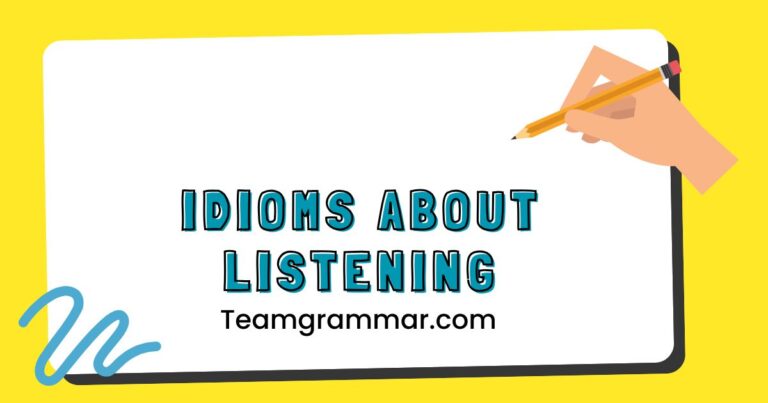41 Idioms for Journeys: A Comprehensive Guide to Travel Expressions
Idioms add color and depth to the English language, especially when describing journeys and travel. Understanding these expressions can significantly enhance your comprehension and fluency, allowing you to express yourself more vividly and naturally.
This article provides a detailed exploration of common idioms related to journeys, covering their meanings, origins, and usage. Whether you’re an English language learner or simply looking to enrich your vocabulary, this guide will equip you with the knowledge to confidently use these idioms in your everyday conversations and writing.
Table of Contents
- Introduction
- Definition of Idioms for Journeys
- Structural Breakdown of Journey Idioms
- Types and Categories of Journey Idioms
- Examples of Idioms for Journeys
- Usage Rules for Journey Idioms
- Common Mistakes with Journey Idioms
- Practice Exercises
- Advanced Topics in Journey Idioms
- Frequently Asked Questions
- Conclusion
Introduction
Idioms are an integral part of any language, adding nuance and color to communication. When discussing journeys, idioms can vividly describe the various stages, challenges, and experiences encountered along the way.
This article focuses specifically on idioms related to travel and journeys, providing detailed explanations, examples, and usage tips. By mastering these expressions, learners can enhance their understanding of English and communicate more effectively about travel-related topics.
This guide is designed for English language learners of all levels, from beginners to advanced speakers. Whether you’re preparing for an English exam, traveling abroad, or simply looking to improve your language skills, this article will provide valuable insights into the world of journey idioms.
Understanding these expressions will not only improve your comprehension but also enable you to express yourself more creatively and accurately.
Definition of Idioms for Journeys
An idiom is a phrase or expression whose meaning cannot be understood from the literal meanings of its individual words. Instead, it has a figurative meaning that is specific to a particular language or culture.
Idioms related to journeys are expressions that use travel-related concepts to convey broader meanings about life, progress, challenges, and experiences.
These idioms often draw on the common experiences and metaphors associated with travel, such as roads, destinations, and modes of transportation. They can be used to describe personal growth, career paths, relationships, or any situation that involves a process or progression.
Understanding the context and cultural background behind these idioms is crucial for accurate interpretation and usage.
Idioms for journeys can be classified based on the aspect of the journey they represent. For example, some idioms describe the beginning of a journey, while others focus on obstacles, progress, or reaching a destination.
Each category provides a unique perspective on the journey metaphor, allowing for a rich and varied expression of ideas.
Structural Breakdown of Journey Idioms
Journey idioms, like all idioms, do not follow standard grammatical rules when interpreted literally. Their structure often involves a combination of nouns, verbs, and prepositions that create a figurative meaning.
Understanding the components of these idioms can help learners remember and use them correctly.
Many journey idioms contain verbs that describe movement, such as “set out,” “take off,” or “go the extra mile.” These verbs are combined with nouns that represent travel elements, such as “road,” “path,” or “destination.” The prepositions used in these idioms often indicate direction or purpose, such as “on the right track” or “off course.”
The structure of journey idioms can also vary depending on the specific meaning they convey. Some idioms are simple phrases, while others are more complex sentences.
However, the key to understanding them lies in recognizing the figurative meaning and the underlying metaphor of the journey.
Types and Categories of Journey Idioms
Journey idioms can be categorized based on the different aspects of a journey they describe. Here are some common categories:
Idioms for Starting a Journey
These idioms describe the beginning or initiation of a process or endeavor. They often involve verbs of movement and nouns that represent the starting point.
Idioms for Obstacles and Challenges
These idioms refer to the difficulties, setbacks, and challenges encountered during a journey. They often use metaphors of rough terrain or unexpected obstacles.
Idioms for Progress and Speed
These idioms describe the rate of progress and the speed at which a journey is advancing. They often involve verbs of acceleration and nouns that represent momentum.
Idioms for Reaching a Destination
These idioms refer to the successful completion of a journey and the achievement of a goal. They often use metaphors of arrival and accomplishment.
Idioms for Unexpected Events
These idioms describe unforeseen circumstances or events that occur during a journey, often altering the course or outcome.
Examples of Idioms for Journeys
The following sections provide detailed examples of journey idioms, categorized by their specific meaning. Each example is accompanied by an explanation and a sample sentence to illustrate its usage.
Idioms for Starting a Journey
These idioms are used to describe the beginning of a new endeavor or process. They often convey a sense of excitement, anticipation, or commitment.
The table below provides examples of idioms used to express the start of a journey, along with their meanings and example sentences.
| Idiom | Meaning | Example Sentence |
|---|---|---|
| Hit the road | To begin a journey | We need to hit the road early to avoid traffic. |
| Set off | To start a journey | They set off on their adventure at dawn. |
| Get underway | To begin or start | The project will get underway next week. |
| Embark on | To start something new or important | She decided to embark on a new career path. |
| Take off | To start a journey or leave | The plane will take off in a few minutes. |
| Get going | To start moving or leave | We need to get going if we want to arrive on time. |
| Be off | To be leaving or starting a journey | I’m off to the library now. |
| Kick off | To begin or start something, usually an event | The conference will kick off with a keynote speech. |
| Get the ball rolling | To start something moving or happening | Let’s get the ball rolling on this project. |
| On the road | Traveling, especially for work | He’s been on the road for the past month. |
| Start the ball rolling | To initiate an action or process | To start the ball rolling, I’ll introduce the main speakers. |
| Get one’s foot in the door | To get a first opportunity | Volunteering helped her get her foot in the door at the company. |
| Launch into | To begin something with enthusiasm | He launched into an explanation of the new policy. |
| Come a long way | To make significant progress | She’s come a long way since she started learning English. |
| Get off the ground | To start successfully | It took a while for the business to get off the ground. |
| Head off | To begin a journey or leave | We should head off before the traffic gets worse. |
| Set sail | To begin a sea journey | The ship set sail early in the morning. |
| On one’s way | In the process of traveling or going somewhere | I’m on my way to the airport now. |
| Hit the trail | To begin hiking or walking | We’re going to hit the trail early tomorrow. |
| Take the plunge | To make a bold decision or start something new | She decided to take the plunge and start her own business. |
| Make a start | To begin something | Let’s make a start on cleaning the house. |
| Begin the voyage | To start a journey, often metaphorical | They began the voyage of building a new community. |
| Set forth | To begin a journey or task | He set forth on his quest for knowledge. |
| Get the show on the road | To start an activity or event | Alright, let’s get the show on the road! |
Idioms for Obstacles and Challenges
These idioms describe the difficulties, setbacks, and challenges encountered during a journey, whether literal or metaphorical. They often use metaphors of rough terrain or unexpected obstacles.
The table below provides examples of idioms used to express obstacles and challenges faced during a journey, along with their meanings and example sentences.
| Idiom | Meaning | Example Sentence |
|---|---|---|
| Hit a snag | To encounter an unexpected problem | We hit a snag in the negotiations. |
| Off the beaten path | In a place where few people go; unconventional | They decided to explore some areas off the beaten path. |
| A bump in the road | A minor setback or obstacle | The delay was just a bump in the road; we’ll recover. |
| Rough patch | A difficult period | They’re going through a rough patch in their relationship. |
| Go uphill | To become more difficult | After the initial success, the project started to go uphill. |
| Against the tide | Opposing the general opinion or trend | He was swimming against the tide with his controversial views. |
| Navigate through | To find a way through a difficult situation | We need to navigate through these challenges carefully. |
| Lose one’s way | To become lost or confused | He lost his way trying to find the museum. |
| Run into a brick wall | To encounter an insurmountable obstacle | We ran into a brick wall trying to get the funding approved. |
| At a crossroads | At a point where a decision needs to be made | She’s at a crossroads in her career. |
| Between a rock and a hard place | Faced with two equally difficult choices | He was between a rock and a hard place, unable to please both sides. |
| Face the music | To accept the consequences of one’s actions | He had to face the music after his mistakes. |
| In deep water | In serious trouble | He found himself in deep water after the scandal. |
| On the rocks | Likely to fail or end | Their relationship is on the rocks. |
| Hit the rocks | To come to an end or fail | The company hit the rocks after the economic downturn. |
| Weather the storm | To survive a difficult period | They managed to weather the storm and recover. |
| Get bogged down | To become stuck or delayed | The project got bogged down in bureaucracy. |
| Up against it | Facing difficulties or opposition | We’re up against it trying to meet the deadline. |
| Go off track | To deviate from the intended course | The discussion went off track and became irrelevant. |
| Stumble upon | To find something unexpectedly | We stumbled upon a hidden gem during our travels. |
| Take a detour | To take an alternate route, often unexpectedly | We had to take a detour because of the road closure. |
| Go around in circles | To make no progress | We’re going around in circles trying to solve this problem. |
| On a slippery slope | A situation that is likely to become worse | He’s on a slippery slope with his gambling addiction. |
Idioms for Progress and Speed
These idioms describe the rate of progress and the speed at which a journey is advancing. They often involve verbs of acceleration and nouns that represent momentum.
The table below provides examples of idioms used to express progress and speed, along with their meanings and example sentences.
| Idiom | Meaning | Example Sentence |
|---|---|---|
| Full steam ahead | To proceed with maximum effort and speed | With the funding secured, it’s full steam ahead for the project. |
| Gain ground | To make progress | The company is gaining ground in the market. |
| Make headway | To make progress | We’re finally making headway on the project. |
| On track | Making progress according to plan | The project is on track to be completed by the deadline. |
| Gather momentum | To increase in speed or force | The campaign is gathering momentum as more people get involved. |
| Pick up speed | To accelerate or increase pace | The car started to pick up speed on the highway. |
| At a snail’s pace | Very slowly | The repairs are proceeding at a snail’s pace. |
| Cruise along | To proceed smoothly and effortlessly | After the initial challenges, the project is now cruising along. |
| Make strides | To make significant progress | She’s making strides in her language learning. |
| Keep pace | To maintain the same speed or progress | We need to keep pace with the competition. |
| Move forward | To advance or progress | We need to move forward with the plan. |
| Pick up the pace | To increase speed or effort | We need to pick up the pace if we want to finish on time. |
| Make good time | To travel quickly and efficiently | We made good time on the drive and arrived early. |
| Inch forward | To move very slowly | The traffic was inching forward on the highway. |
| Leap ahead | To make rapid progress | The company leaped ahead of its competitors with the new technology. |
| Gather steam | To gain momentum or energy | The project is gathering steam as more people contribute. |
| Like a shot | Very quickly | He ran like a shot to catch the bus. |
| At warp speed | Very quickly | Technology is advancing at warp speed. |
| Gain traction | To gain support or popularity | The idea is gaining traction among the team members. |
| Go places | To be successful | He’s a talented young man; he’s going to go places. |
Idioms for Reaching a Destination
These idioms refer to the successful completion of a journey and the achievement of a goal. They often use metaphors of arrival and accomplishment.
The table below provides examples of idioms used to express reaching a destination, along with their meanings and example sentences.
| Idiom | Meaning | Example Sentence |
|---|---|---|
| Reach the end of the road | To come to the final stage or conclusion | Their relationship has reached the end of the road. |
| Get there | To achieve a goal or reach a destination | With hard work, you’ll get there eventually. |
| Arrive at | To reach a conclusion or decision | We arrived at a consensus after the meeting. |
| Come to fruition | To be realized or fulfilled | His plans finally came to fruition after years of effort. |
| See the light at the end of the tunnel | To see a sign of hope after a difficult period | We’re finally seeing the light at the end of the tunnel. |
| Touch down | To land or arrive | The plane will touch down in a few minutes. |
| Reach one’s destination | To arrive at the intended place or goal | After a long journey, they finally reached their destination. |
| Get to the finish line | To complete a task or achieve a goal | We’re working hard to get to the finish line. |
| Home stretch | The final part of a journey or task | We’re in the home stretch now; we just need to finish the last few tasks. |
| Come full circle | To return to the starting point or original state | After years of traveling, he came full circle and returned to his hometown. |
| At the end of the line | The final point or limit | This is at the end of the line for this project. |
| Complete the journey | To finish a process or task | They completed the journey of building their dream home. |
| Land on one’s feet | To recover from a difficult situation | He always manages to land on his feet, no matter what. |
| Reap the rewards | To enjoy the benefits of one’s efforts | After all the hard work, they finally reaped the rewards. |
| Get to the promised land | To reach a place of happiness or success | He finally got to the promised land after years of struggle. |
| At long last | Finally, after a long time | At long last, they reached their goal. |
Idioms for Unexpected Events
These idioms describe unforeseen circumstances or events that occur during a journey, often altering the course or outcome.
The table below provides examples of idioms used to express unexpected events, along with their meanings and example sentences.
| Idiom | Meaning | Example Sentence |
|---|---|---|
| Take a turn for the worse | To become worse or deteriorate | His health took a turn for the worse. |
| Go awry | To go wrong or not as planned | The project went awry due to unforeseen circumstances. |
| Come out of the blue | To happen unexpectedly | The opportunity came out of the blue. |
| Out of nowhere | Suddenly and unexpectedly | The storm appeared out of nowhere. |
| Take by surprise | To surprise someone | The news took him by surprise. |
| A bolt from the blue | A sudden and unexpected event | The resignation was a bolt from the blue. |
| Turn upside down | To change drastically | The scandal turned their lives upside down. |
| Throw a wrench in the works | To disrupt or spoil a plan | The delay threw a wrench in the works. |
| Derail the plans | To cause plans to fail | The accident derailed the plans for the trip. |
| Take an unexpected turn | To change direction suddenly | The story took an unexpected turn. |
| Change of scenery | A change in environment or situation | A change of scenery might do you good. |
| Off course | Deviating from the intended path or plan | The project went off course due to budget cuts. |
| A twist of fate | An unexpected event that changes the course of events | By a twist of fate, they met again after many years. |
| Go pear-shaped | To go wrong or fail | The party went pear-shaped when the music stopped. |
Usage Rules for Journey Idioms
Using journey idioms correctly requires an understanding of their figurative meanings and the contexts in which they are appropriate. Here are some general rules to follow:
- Understand the meaning: Always make sure you understand the figurative meaning of the idiom before using it.
- Consider the context: Use idioms in contexts where they are appropriate and relevant.
- Avoid overuse: Using too many idioms can make your language sound unnatural or forced.
- Be aware of cultural differences: Some idioms may have different meanings or connotations in different cultures.
- Pay attention to grammar: Ensure that the idiom fits grammatically within the sentence.
It’s also important to note that some idioms may have variations or alternative forms. Be sure to use the correct form and spelling.
Common Mistakes with Journey Idioms
Learners often make mistakes when using journey idioms due to a lack of understanding of their figurative meanings or the contexts in which they are appropriate. Here are some common mistakes to avoid:
The following table illustrates some common mistakes people make when using journey idioms.
| Incorrect | Correct | Explanation |
|---|---|---|
| He hit the road yesterday morning at 9 AM. (Literal) | He hit the road early yesterday morning. | “Hit the road” means to begin a journey, not to physically strike a road. |
| They are sailing the boat on a new career. | They are embarking on a new career. | “Embark on” is the correct idiom for starting a new venture. |
| We need to move the ball rolling. | We need to get the ball rolling. | The correct idiom is “get the ball rolling,” not “move the ball rolling.” |
| The project went to uphill. | The project went uphill. | The correct idiom is “go uphill,” without the preposition “to.” |
| She is in a rock and a hard place. | She is between a rock and a hard place. | The correct idiom is “between a rock and a hard place.” |
| They are seeing light at the tunnel’s end. | They are seeing the light at the end of the tunnel. | The correct idiom is “the light at the end of the tunnel.” |
| He reached the road’s end. | He reached the end of the road. | The correct idiom is “the end of the road.” |
| The opportunity came from the blue. | The opportunity came out of the blue. | The correct idiom is “out of the blue.” |
Practice Exercises
Test your understanding of journey idioms with the following practice exercises. Choose the correct idiom to complete each sentence.
Exercise 1: Fill in the Blanks
Choose the correct idiom from the list below to complete each sentence.
Idiom List: hit the road, embark on, a bump in the road, gaining ground, reach the end of the road, out of the blue
- We need to ___________ early to avoid the traffic.
- She decided to ___________ a new career path.
- The delay was just ___________; we’ll recover quickly.
- The company is ___________ in the market.
- Their relationship has ___________.
- The opportunity came ___________.
Exercise 2: Multiple Choice
Choose the correct idiom from the options provided to complete each sentence.
- We need to ___________ if we want to finish on time.
- a) pick up the pace
- b) pick up the speed
- c) pick the pace up
- He always manages to ___________, no matter what.
- a) land on his feet
- b) land on his foot
- c) land on her feet
- The project __________ due to unforeseen circumstances.
- a) went awry
- b) went away
- c) went a wry
- They are ___________ in their relationship.
- a) on the rocks
- b) on the rock
- c) on the rocks’
- We’re finally ___________ after a difficult period.
- a) seeing the light at the end of the tunnel
- b) seeing the light in the tunnel’s end
- c) seeing light at tunnel’s end
Answer Key:
Exercise 1:
- hit the road
- embark on
- a bump in the road
- gaining ground
- reached the end of the road
- out of the blue
Exercise 2:
- a) pick up the pace
- a) land on his feet
- a) went awry
- a) on the rocks
- a) seeing the light at the end of the tunnel
Here is another practice exercise for you to complete.
Exercise 3: Matching
Match the idiom with its correct meaning.
Instructions: Match the idioms in Column A with their meanings in Column B.
| Column A (Idiom) | Column B (Meaning) |
|---|---|
| 1. Get the ball rolling | a. To encounter an unexpected problem |
| 2. Hit a snag | b. To deviate from the intended course |
| 3. Go off track | c. To begin something |
| 4. Full steam ahead | d. To make rapid progress |
| 5. Leap ahead | e. To proceed with maximum effort and speed |
Answer Key:
1-c, 2-a, 3-b, 4-e, 5-d
Advanced Topics in Journey Idioms
For advanced learners, exploring the nuances and cultural contexts of journey idioms can provide a deeper understanding of the English language. This includes researching the origins of specific idioms, analyzing their metaphorical meanings, and comparing them to similar expressions in other languages.
Additionally, advanced learners can explore the use of journey idioms in literature, film, and other forms of media. Analyzing how these idioms are used in different contexts can provide insights into their cultural significance and their ability to convey complex ideas and emotions.
Another advanced topic is the creation of new idioms. While most idioms are established expressions, it is possible to create new ones that capture contemporary experiences and ideas.
This requires a deep understanding of language, culture, and the art of metaphor.
Frequently Asked Questions
- What is an idiom?
An idiom is a phrase or expression whose meaning cannot be understood from the literal meanings of its individual words. It has a figurative meaning that is specific to a particular language or culture.
- Why are idioms important?
Idioms add color and depth to the English language, making it more expressive and nuanced. Understanding idioms can improve your comprehension and fluency, allowing you to communicate more effectively.
- How can I learn idioms?
You can learn idioms by reading widely, listening to native speakers, and using online resources and textbooks. Pay attention to the context in which idioms are used and practice using them in your own conversations and writing.
- What are some common categories of journey idioms?
Common categories of journey idioms include those for starting a journey, obstacles and challenges, progress and speed, reaching a destination, and unexpected events.
- How can I avoid making mistakes with idioms?
To avoid making mistakes with idioms, always make sure you understand their figurative meanings and the contexts in which they are appropriate. Avoid overuse and be aware of cultural differences.
- Are idioms the same in all English-speaking countries?
No, some idioms may vary or have different meanings in different English-speaking countries. It’s important to be aware of these regional variations.
- Can I create my own idioms?
While most idioms are established expressions, it is possible to create new ones. However, this requires a deep understanding of language, culture, and the art of metaphor.
- Where can I find more examples of journey idioms?
You can find more examples of journey idioms in dictionaries, online resources, and textbooks. Pay attention to how they are used in literature, film, and other forms of media.
- How do I know when to use an idiom?
Use idioms when they fit naturally into the conversation or writing and when they enhance the meaning and expressiveness of your language. Avoid using them in formal or technical contexts where clarity and precision are paramount.
- Is it better to use idioms in writing or speaking?
Idioms are appropriate in both speaking and writing, but it depends on the context and audience. In formal writing, such as academic papers or business reports, it’s generally best to avoid idioms and use more direct language. However, in creative writing, informal emails, or casual conversations, idioms can add color and personality to your communication.
Conclusion
Mastering idioms for journeys can significantly enhance your understanding and fluency in English. These expressions add color and depth to your language, allowing you to express yourself more vividly and naturally.
By understanding the meanings, origins, and usage of these idioms, you can communicate more effectively and confidently about travel-related topics and beyond.
Remember to practice using these idioms in your everyday conversations and writing. Pay attention to the context in which they are used and be aware of any cultural differences.
With consistent effort and practice, you can master these expressions and enrich your English language skills.







